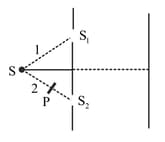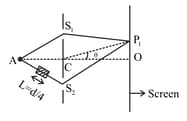NCERT Solutions for Chapter: Wave Optics, Exercise 4: LA
NCERT Physics Solutions for Exercise - NCERT Solutions for Chapter: Wave Optics, Exercise 4: LA
Attempt the practice questions on Chapter 10: Wave Optics, Exercise 4: LA with hints and solutions to strengthen your understanding. NCERT Exemplar Physics - Class 12 solutions are prepared by Experienced Embibe Experts.
Questions from NCERT Solutions for Chapter: Wave Optics, Exercise 4: LA with Hints & Solutions
Figure shows a two slit arrangement with a source which emits unpolarized light. is a polariser with axis whose direction is not given. If is the intensity of the principal maxima when no polariser is present, calculate in the present case, the intensity of the principal maxima as well as of the first minima.

A small transparent slab containing material of is placed along . What will be the distance from of the principal maxima and of the first minima on either side of the principal maxima obtained in the absence of the glass slab.

The optical properties of a medium are governed by the relative permittivity and relative permeability ( ). The refractive index is defined as .For ordinary material and and the positive sign is taken for the square root. In , a Russian scientist . Veselago postulated the existence of material with and . Since then such ‘metamaterials’ have been produced in the laboratories and their optical properties studied. For such materials . As light enters a medium of such refractive index the phases travel away from the direction of propagation.
According to the description above show that if rays of light enter such a medium from air (refractive index =) at an angle in quadrant, them the refracted beam is in the quadrant.
The optical properties of a medium are governed by the relative permitivity and relative permeability ( ). The refractive index is defined as .For ordinary material and and the positive sign is taken for the square root. In , a Russian scientist . Veselago postulated the existence of material with and . Since then such ‘metamaterials’ have been produced in the laboratories and their optical properties studied. For such materials . As light enters a medium of such refractive index the phases travel away from the direction of propagation.
Prove that Snell’s law holds for such a medium.
To ensure almost per cent transmittivity, photographic lenses are often coated with a thin layer of dielectric material. The refractive index of this material is intermediated between that of air and glass (which makes the optical element of the lens). A typically used dielectric film is . What should the thickness of the film be so that at the center of the visible speetrum there is maximum transmission.
